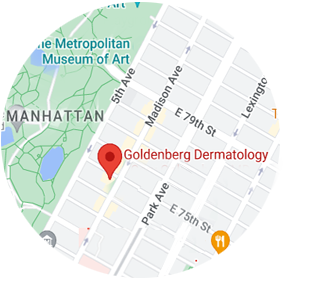Dr. Goldenberg quoted on Everyday Health about Psoriasis!
Opening Up to a Psoriasis Support Group: Ninfa’s Story
If you’ve felt hesitant to join a psoriasis support group, meet Ninfa Cantu. She’ll tell you how powerful joining one can be.
By Marie Suszynski
Medically reviewed by Pat F. Bass III, MD, MPH
Every November, San Antonio, Texas, resident Ninfa Cantu has a celebration to commemorate the onset of her psoriasis symptoms in 1979. This November made 34 years. “People ask me why I celebrate an illness,” Cantu says. “I celebrate because it’s a part of my life — it’s a part of me.”
Because of psoriasis, she also has a new family, one that grew after she started a psoriasis support group in 2003. The group meets about every two months. Not only have they exchanged stories and used the time to learn about their disease, but they have also formed strong friendships. One support group member invited Cantu to her to a wedding. Another gives her a Christmas present every year.
Most importantly, they give each other hope. “That’s the power of the support group,” Cantu says.
Why Psoriasis Support Is So Important
Studies have found that psoriasis significantly affects people’s quality of life, says Gary Goldenberg, MD, medical director of the Dermatology Faculty Practice at Mount Sinai Medical Center and an assistant professor of dermatology and pathology at the Icahn School of Medicine at Mount Sinai in New York City. Among the findings is evidence that the bigger the skin area affected by psoriasis, the lower your quality of life, especially among women and young people.
Part of what’s so troubling about psoriasis is that it’s chronic. Once you’re diagnosed, you know you’ll always have it, Dr. Goldenberg says. However, when you spend time around others with psoriasis, you’ll see people who do get better as time goes on, and it can help you understand that you can find effective treatments, too.
Another major issue for many people with psoriasis is the way they’re treated by others who don’t understand the disease. Strangers, even friends and family members, may think psoriasis is contagious, which obviously isn’t true.
“I make sure my patients see me touching their skin with bare hands,” Goldenberg says. “I want to show them I’m not afraid to touch them because it’s not contagious.”
Psoriasis Support Groups: ‘Like a Burden Lifted’
Because Cantu doesn’t cover up her skin, people were often approaching her and asking questions about her psoriasis. She decided to start a bilingual support group because she saw the need for one in her community. There’s a strong Hispanic culture in San Antonio, and her group sometimes holds meetings in Spanish so that everyone feels included.
Twenty people showed up for that first meeting 10 years ago. Many came with questions, like whether their children will have psoriasis and what are the best ways to treat it. Now, members of the group bring family members to meetings so they, too, can learn about psoriasis. Sometimes they break up into pairs to talk to each other and tell their stories. “People can let out their frustrations,” Cantu says.
One man who joined the support group confided that, as a child, his parents left him in the garage because they thought he had something like HIV/AIDS. “He felt the need to talk about his situation,” Cantu says. “It helps to learn you’re not alone and that other people can relate to what you’re going through.”
Cantu’s group once brought in a physician to speak about the social-psychological effects of psoriasis, and it’s hosted psoriasis fairs. She and other members also met with a local congressman to talk about how psoriasis has affected them and the importance of having access to prescription drug coverage for treatment.
Over the years, Cantu’s psoriasis has caused her to be hospitalized three times, and she’s also developed psoriatic arthritis and fibromyalgia. Last year, she was hit by a truck and sustained injuries that have made it difficult for her to walk. But she has good friends — friends through her support group — that she can turn to.
Once in a while, Cantu comes across someone who’s hesitant to join the group. In these situations, she talks to him or her about how empowering support groups can be. “Join one, because you don’t know how much relief you’ll get until you try it,” she says. “It’s like a burden lifted when you know you’re not alone.”
How You Can Find Psoriasis Support
Cantu started her support group on her own, but since then, the National Psoriasis Foundation has picked it up. To find a group in your area, go to the foundation’s Web site at www.psoriasis.org.













Leave a Reply
Want to join the discussion?Feel free to contribute!